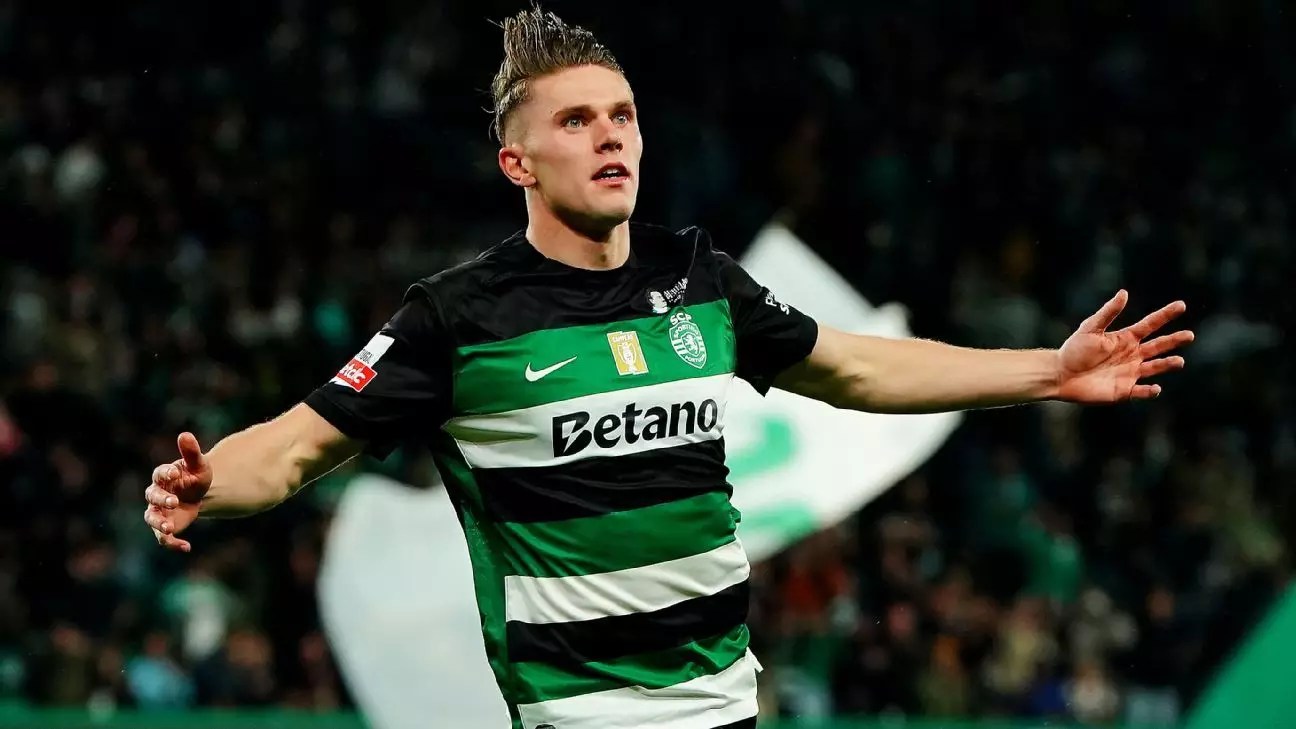In the dynamic world of football transfers, few sagas captivate fans and insiders alike as passionately as Arsenal’s bid to land Viktor Gyökeres. The Swedish international, currently plying his trade at Sporting CP, has become the focal point of intense speculation. Arsenal’s confidence signals their conviction that this deal will materialize soon, especially as they navigate a busy transfer window following the record signing of Martín Zubimendi from Real Sociedad for €60 million. Gyökeres, who is eager to make his mark in the Premier League, has publicly rejected offers from clubs in the Middle East, emphasizing his desire for a move that aligns with his ambitions—namely, to establish himself at the Emirates.
This pursuit illustrates Arsenal’s strategic approach: investing heavily in promising talent to bolster their squad and challenge the traditional dominance. Gyökeres’ willingness to threaten a strike underscores not just his determination but also the high stakes involved. Sporting CP remains a key gatekeeper, with reports suggesting a valuation upwards of €70 million plus variables. The fact that the player considers a move to Arsenal his “dream” adds a poignant layer; it elevates the transfer beyond mere finances and tactical needs. This saga exemplifies how clubs are willing to push boundaries financially for the right player, fueling speculation about Premier League dominance and Europe’s transfer supremacy.
Manchester United’s Strategic Moves: Securing a Goal-Scoring Asset on a Free
Manchester United’s transfer strategy this window is notably pragmatic, targeting proven Premier League talent with a history of consistent goals. The hunt for Dominic Calvert-Lewin poignantly highlights their pursuit of a striker capable of spearheading their attack, particularly following Cristiano Ronaldo’s departure and the turbulent search for stability upfront. The fact that Calvert-Lewin is a free agent after nine years at Everton offers United leverage, but their interest remains serious and calculated.
Calvert-Lewin’s injury history casts some doubt over his reliability, but his goal-scoring record—57 goals in 240 Premier League appearances—demonstrates his potential. United’s willingness to incorporate him into their plans signals a shift toward pragmatic signing strategies—valuing experience and goal productivity over pure potential. Manager Ruben Amorim’s apparent eagerness to integrate him alongside new signing Matheus Cunha indicates a broader plan of bolstering the attacking options, potentially energizing United’s ambitions during the upcoming season. His signing could symbolize United’s readiness for a more direct, goal-oriented approach, underscoring their desire to re-establish a competitive edge in the Premier League.
Young Talents and Strategic Contracts: Arsenal’s Future Planning
While the spotlight often shines brightest on high-profile signings, Arsenal’s ongoing contract negotiations with Ethan Nwaneri reveal the nuanced, future-oriented strategy this club embraces. The 18-year-old prodigy has showcased immense potential, yet he remains cautious about committing without assurances of adequate game time. This reflects a mature understanding of his development needs, highlighting the importance of nurturing talent from within and ensuring young players’ growth aligns with team ambitions.
The interest from Chelsea, eager to capitalize on Arsenal’s hesitations, underscores the volatile nature of youth transfers. Meanwhile, Arsenal’s discussions over Noni Madueke, valued at over £50 million, indicate their ambition to blend youth with proven European talent. This approach demonstrates a careful but aggressive stance—prioritizing building a squad capable of competing on multiple fronts without sacrificing the development of their brightest prospects. Strategic contracts for young players are not merely about squad depth; they are about creating a pipeline of talent that can sustain success in the modern game.
European Transfer Outlook: Power Shifts and Tactical Rationales
Across Europe, transfer tides are shifting rapidly, with clubs like Barcelona, PSG, and Juventus recalibrating their strategies. Barcelona’s decision to withdraw interest in Denzel Dumfries signals a commitment to their current squad depth, favoring established options like Jules Koundé over expensive new signings. This reflects a broader trend among top clubs: prioritizing strategic stability while remaining alert to opportunistic signings.
Meanwhile, PSG’s aggressive pursuit of Randal Kolo Muani at €40 million marks their continued intent to bolster attack options, especially following their high-profile acquisitions. Juventus, on the other hand, are planning a busy transfer window, eyeing players like Yves Bissouma and potentially secure a permanent deal for Kolo Muani if PSG’s plans evolve. As for Napoli, their firm stance on Osimhen’s €75 million release clause underscores the high valuation of top-tier talent, demonstrating how clubs are willing to flex financial muscle for the right stars.
In the context of emerging talents, Ajax’s young star Abdellah Ouazane’s move to Real Madrid reflects a broader pipeline of youth talent flowing into Europe’s elite clubs. The strategic exchange of players between clubs like Bologna and Napoli shows how tactical signings are increasingly interconnected, with clubs meticulously planning their squad over several transfer windows.
The Window’s Winner: A Battle for Top Talent and Club Supremacy
What emerges in this frenetic transfer environment is a landscape shaped by power struggles between clubs, each vying for strategic advantage. Arsenal’s pursuit of Gyökeres and Madueke exemplifies their ambition to elevate their squad with a blend of youth and experience. Manchester United’s focus on proven goal scorers illustrates a pragmatic approach, seeking immediate impact. Meanwhile, European giants are recalibrating their strategies—Barcelona’s cautious stance, PSG’s aggressive signings, Juventus’s broad scouting net—all reflect the complex chess game being played.
The transfer window is less about individual signings and more about shaping a competitive ecosystem where clubs are willing to push boundaries—financially and tactically—to emerge victorious. Talent acquisition is now a high-stakes game, with each move carrying implications for the coming season and beyond. The clamor over young prospects, experienced internationals, and strategic deals underscores a fundamental truth: in modern football, power is measured not just by the players on the pitch but by the smarts and resolve behind the transfer negotiations.


Leave a Reply